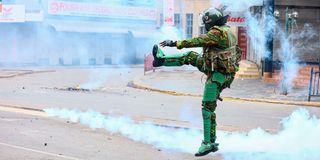Premium
How tear gas loud bangs trigger mental health struggles

A tear gas canister explodes along Moi Avenue in Nairobi during the anti-Finance bill protesters on June 25, 2024.
What you need to know:
- According to psychologists, explosions of teargas canisters destabilise those with psychological illnesses.
- Children, who may not fully understand the situation or how to process their emotions, can similarly be affected.
The recent escalation of violence during the anti-government protests has raised serious concerns about how the perpetually loud tear gas explosions affect Kenyans living with mental conditions.
Psychologists say the loud bangs as teargas canisters explode into the air to disperse protesters, destabilise those with psychological illnesses or trauma.
Mercy Wangui recounts the experience that made her resolve to seek psychological help.
“When I joined the protests with my friends, the police began throwing tear gas canisters, and with every explosion, I could feel my heart palpitate so hard. Everyone around me would get charged or excited, but I got panic attacks and anxiety with every explosion. I don’t think I will ever join the protests again,” she says.
Rechael Mbugwa, a psychologist, says people with post-traumatic stress disorder (PTSD) are more likely to be triggered by tear gas sounds.
“Those who have experienced trauma, particularly related to violence or conflict, can be severely affected. People who have faced domestic violence, sexual assault, or other forms of abuse may have heightened sensitivity to such triggers,” she says.
“Military veterans who have been exposed to combat situations might also find these sounds particularly triggering,” she adds.
Another group likely to be affected is children, who may not fully understand the situation or how to process their emotions.
Ms Mbugwa tells Lifestyle that teargas sounds could trigger anxiety and panic attacks in people dealing with PTSD.

An anti-riot police kick teargas toward demonstrators on Moi Avenue, Nairobi during anti-government protests on July 16, 2024.
“Additionally, these sounds can cause flashbacks to previous traumatic events, leading to intense psychological distress.”
Loice Noo, a counselling psychologist, warns that tear gas sounds could also cause sleep disturbance.
“It affects the quality of the sleep and the length of the sleep. People can have difficulty falling asleep and get nightmares,” says Ms Noo, adding this is aggravated in patients struggling with PTSD, “They become watchful and alert beyond what is normal.”
The level of the trigger depends on someone’s recovery journey.
“If they are still in an intense phase of their recovery, the trigger could cause a relapse. If a person is at a place where they are in a better place of recovery, such triggers would startle the person, but they would have to refer back to their coping mechanisms (especially for those who have sought treatment),” she says.
To cope, she adds that one should have supportive people around for a while.
Ms Noo says there are tell-tale signs to know if these loud sounds are affecting your mental health.
“A trigger from the tear gas sounds would affect the quality of one's thinking such that doing something becomes a process. You avoid things to the point where you are no longer functional. For instance, if you were triggered while in town, you would rather resign from work than go to town or buy from an expensive place rather than go to the place where it would be much cheaper,” she says.

A protester kicks back a teargas canister on Moi Avenue, Nairobi during anti-government demonstrations on July 16, 2024.
“If a person begins to smell the teargas when away from that environment or they start feeling chocked even when they are out of that environment, then they should realise that there is a new trigger and the mind is not managing it very well.”
Emmah Muchoki, a clinical psychologist at Thrive Therapy in Nairobi, says that one can deal with the triggers to help reduce the side effects.
“There is exposure therapy, where you are exposed to that which you fear in small bits until you get to a point that it won’t trigger you anymore.”

A protestor throws a teargas canister towards anti-riot police officers on Tom Mboya Street, Nairobi during anti-government protests on July 16, 2024.
Ms Mbugwa advises that support groups could also help triggered people, as “sharing experiences with others who have gone through similar situations can provide emotional support and coping strategies.”
She also recommends mindfulness and relaxation techniques that could help one cope with the triggers. She advises trying meditation, deep breathing exercises, and yoga.
“Recovery from trauma and its triggers is a gradual process, and with appropriate treatment and support, individuals can experience significant improvements and lead fulfilling lives,” she says.




